Key takeaways:
- Hydration is essential for both physical performance and cognitive function; even mild dehydration can impact energy levels and mood.
- Adequate fluid intake helps prevent injuries by maintaining joint lubrication, enhancing muscle function, and supporting recovery.
- Daily hydration goals should include at least eight 8-ounce glasses of water, with additional intake on active days, and incorporating hydrating foods is beneficial.
- Using electrolyte drinks and monitoring hydration before and after exercise can significantly improve performance and recovery.
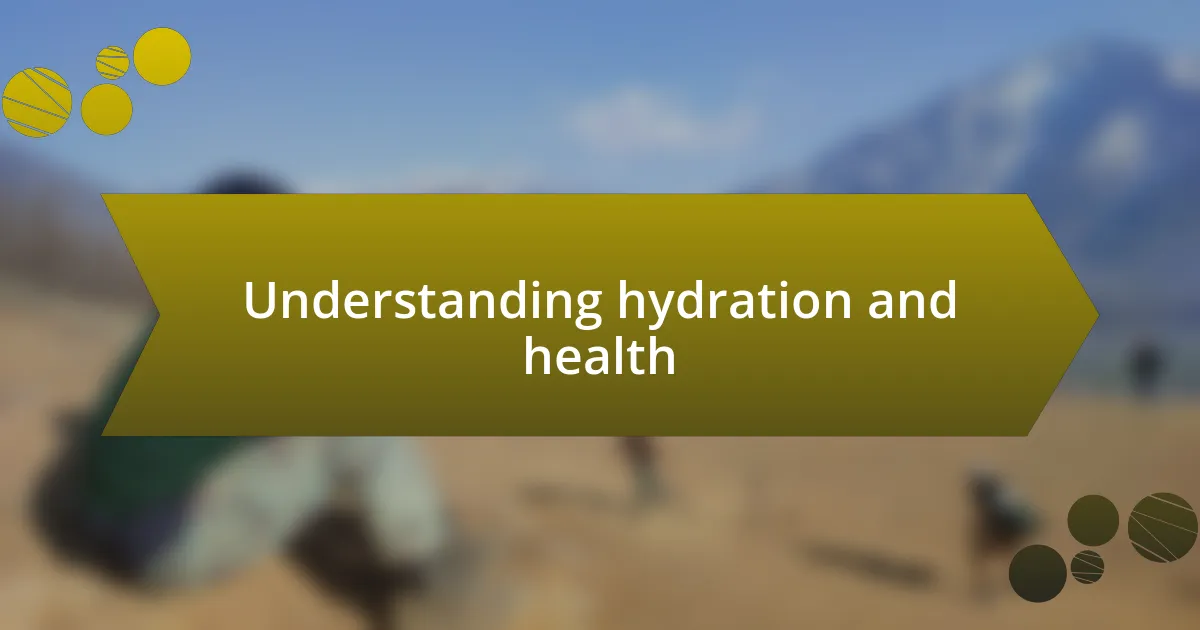
Understanding hydration and health
Hydration is often overlooked, yet it plays a crucial role in maintaining overall health and well-being. I remember a time when I was deep into training and decided to skip my water breaks. The result? I felt sluggish and unfocused, which really impacted my performance. Have you ever experienced that dragging feeling? It’s a reminder that our bodies depend on water not just for physical activity but for cognitive function as well.
When I think about hydration, I see it as a balancing act that supports everything from digestion to energy levels. Each cell in our body needs water to function properly, and even mild dehydration can lead to fatigue and irritability. Have you ever felt a headache creep in after a long day without enough water? It’s no coincidence; our bodies are trying to signal that something is off.
Moreover, hydration is key for recovery, especially when recovering from injuries. I’ve found that staying adequately hydrated helps my muscles repair faster and reduces soreness. It’s fascinating how something as simple as drinking enough water can make such a significant difference in how I feel and recover. How much have you thought about your hydration lately? Sometimes, just bringing a water bottle to my workouts serves as a little mental reminder to prioritize my health.
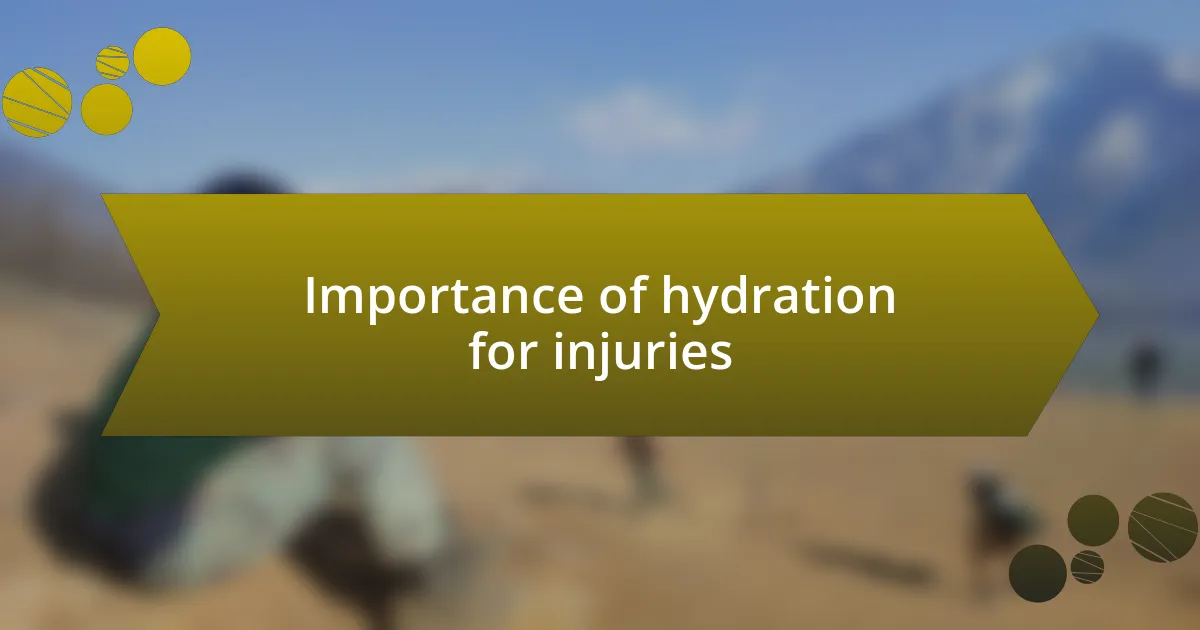
Importance of hydration for injuries
Hydration is far more than quenching thirst; it’s a cornerstone of injury prevention. In my early sports days, I once ignored hydration during a grueling practice, thinking I could push through. Not only did I suffer from cramps, but I also found myself more susceptible to injuries later on. It was a tough lesson, but it taught me that proper hydration can significantly enhance muscle elasticity and joint lubrication. When I pay attention to my fluid intake, I notice my body feels resilient and ready to perform.
Here are some critical points highlighting the importance of hydration for preventing injuries:
- Maintains Joint Lubrication: Adequate hydration keeps synovial fluid plentiful, which protects joints from wear and tear.
- Enhances Muscle Function: Well-hydrated muscles contract and relax more efficiently, reducing the risk of strains.
- Supports Recovery: Staying hydrated post-injury accelerates the healing process by facilitating nutrient delivery to damaged tissues.
- Regulates Body Temperature: Proper fluid levels help maintain an even body temperature, minimizing the risk of heat exhaustion during intense activity.
- Prevents Cramping: Sufficient hydration can significantly lessen the chances of painful muscle cramps that often lead to injury.
Reflecting on my experience, whenever I boost my water intake, I generally feel more energetic and less prone to the kinds of aches and pains that can sideline my goals. It’s impressive how something as simple as drinking enough water can be so influential in supporting our physical endeavours.
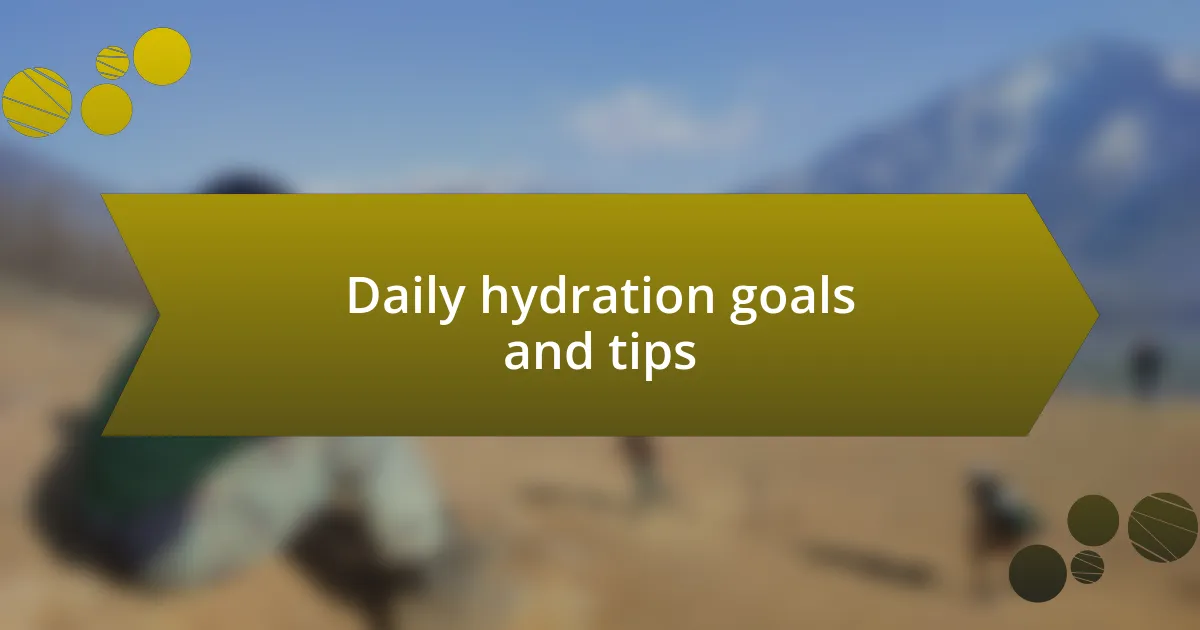
Daily hydration goals and tips
Daily hydration goals should be tailored to individual needs, but a common rule of thumb is to aim for at least eight 8-ounce glasses of water a day. When I started tracking my fluid intake, I realized that it’s easy to forget to drink enough, especially during busy days. I began setting reminders on my phone, and now I find it a natural part of my routine, akin to how I prioritize my meals.
A practical tip I’ve discovered is to carry a reusable water bottle with me everywhere. Not only does it serve as a visual reminder to drink, but it also helps me monitor my intake throughout the day. For instance, on days when I have intense workouts or outdoor activities planned, I make it a point to increase my hydration goal by another liter. This simple adjustment keeps me feeling more alert and ready for whatever challenges come my way.
Additionally, I’ve learned to incorporate hydrating foods like fruits and vegetables into my meals. Watermelon and cucumbers are favorites of mine, and they not only add a refreshing taste but also contribute to my overall hydration. When I include these in my daily diet, I can genuinely feel the difference in my energy levels and flexibility. Hydration isn’t just about drinking water; it’s about making conscious choices that support my body’s needs.
| Hydration Goals | Tips |
|---|---|
| 8-10 cups per day | Set reminders to drink water |
| Increase on active days | Carry a reusable water bottle |
| Incorporate hydrating foods | Add fruits like watermelon |

Best fluids for hydration
The best fluids for hydration go beyond just tap water; they should be effective and enjoyable to drink. Personally, I find electrolyte drinks to be incredibly helpful during long runs or intense workout sessions. They not only replenish lost fluids but also provide essential minerals, keeping me feeling vibrant and energized. Have you ever noticed the difference in your performance after a good electrolyte drink?
I also appreciate coconut water as a natural alternative. It has a mild sweetness and a wealth of potassium, which is fantastic for muscle recovery. After a tough workout, I often reach for a cold coconut water instead of a sugary sports drink, and I genuinely feel the refreshing benefits. It’s like treating myself to something delicious while also doing right by my body.
Lastly, herbal teas have become a staple in my hydration routine. Whether it’s a warm chamomile tea before bed or a refreshing mint infusion during the day, these drinks offer hydration with added flavor and benefits. On chilly mornings, sipping a warm herbal tea feels comforting and contributes to my overall fluid intake. Isn’t it great to find pleasure in something as essential as hydration?
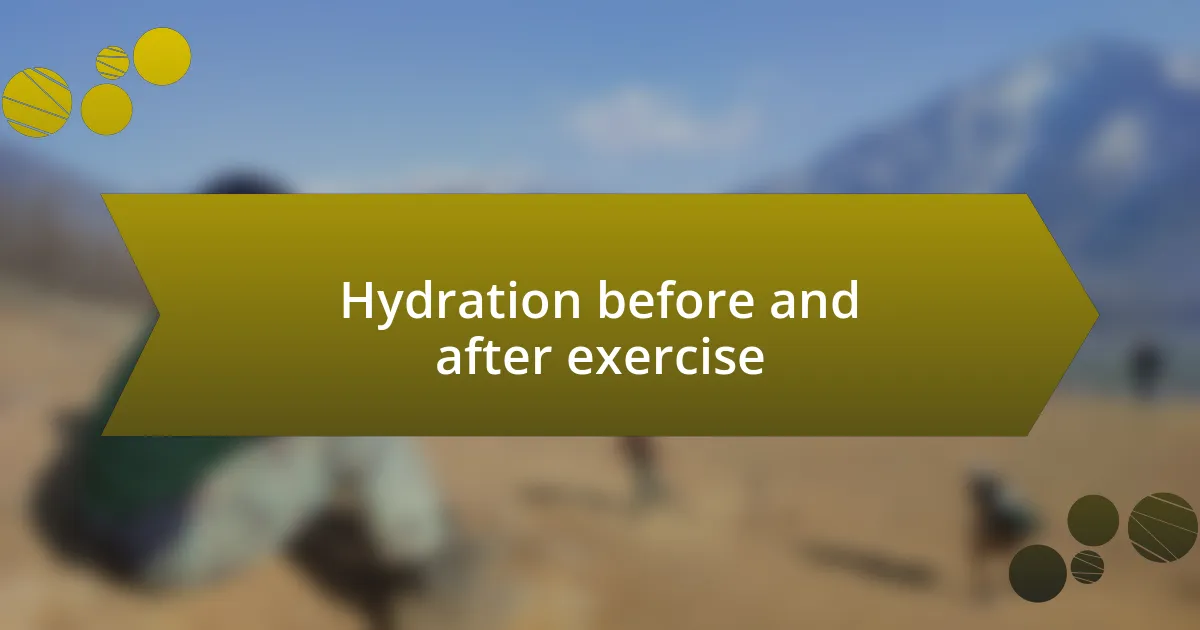
Hydration before and after exercise
Staying hydrated before exercise is crucial, and I’ve learned this the hard way. I remember a day when I didn’t drink enough water before a morning run. Halfway through, I was hit with fatigue and felt lightheaded. Now, I make sure to hydrate well in advance, filling my bottle the night before and taking a moment to sip during that quiet hour before my workout. It’s amazing how a little foresight can transform how I perform.
After my workouts, I prioritize hydration to aid recovery. I’ve found that drinking a protein smoothie with added water or coconut water works wonders for my muscles. The blend not only helps to replenish lost fluids but also kick-starts my recovery process. There’s something satisfying about sipping on that smoothie, knowing I’m nurturing my body after pushing it to its limits. It’s almost like a reward for the effort I put in.
I also pay attention to how my body feels after exercise. Sometimes, I underestimate how much water I need, especially on hot days or after intense sessions. I’ve learned to gauge my hydration levels by monitoring my urine color and energy levels. If I’m feeling sluggish, it’s usually a sign I need to up my intake. Do you ever reflect on how different hydration strategies impact your energy? For me, it’s a game-changer.
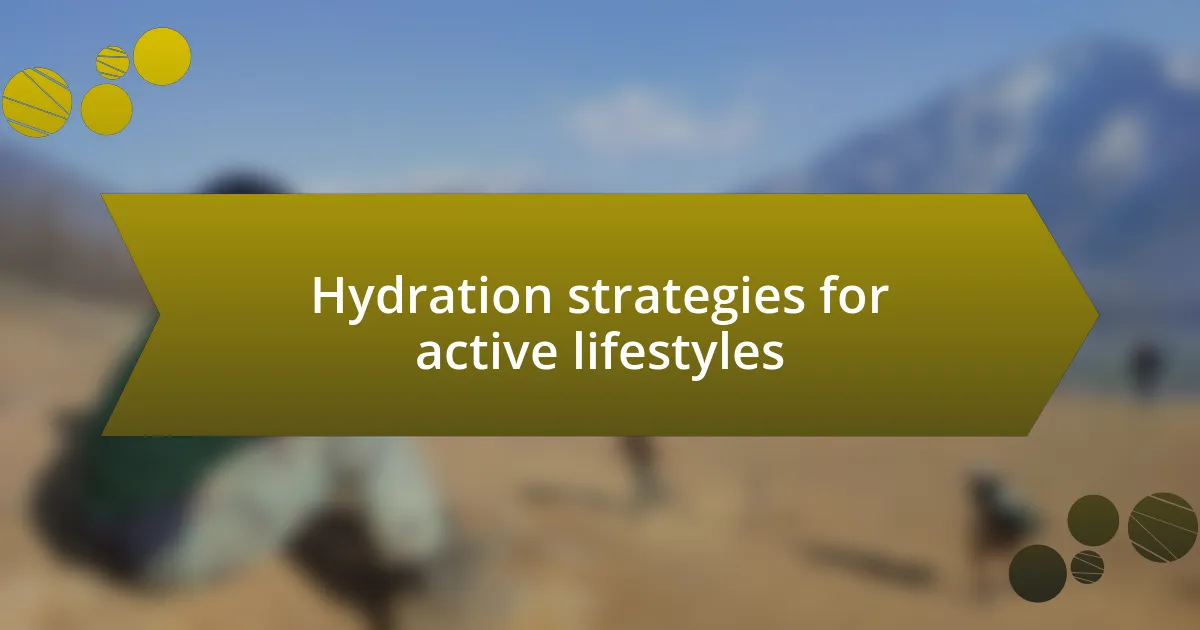
Hydration strategies for active lifestyles
Keeping hydrated during exercise is as vital as the workout itself. I’ve found that having a designated hydration schedule helps me stay on track. For instance, I set reminders on my phone to drink water every 20-30 minutes during prolonged activities. This simple strategy ensures I’m not just waiting until I feel thirsty, which can often be too late. Have you ever realized how easily we can forget to hydrate while focused on our workout?
Incorporating hydrating foods into my daily routine has also made a significant difference. I remember discovering how refreshing watermelon could be on a hot day after an intense cycling session. Not only is it packed with water, but it also delivers essential electrolytes that replenish my energy. I try to keep a stash of hydrating fruits like oranges and cucumbers nearby so that healthy snacking also doubles as hydration. It’s funny how tasty motivation can just keep you going, isn’t it?
Lastly, I’ve learned to adjust my hydration practices based on the type of exercise I’m doing. For high-intensity workouts or long endurance runs, I mix in electrolyte drinks to replace what I sweat out. I’ve noticed that just plain water sometimes doesn’t cut it after a grueling session. Reflecting on my experiences, it’s clear that understanding my body’s hydration needs plays a crucial role in my overall performance and injury prevention. How do you adjust your hydration depending on your activities? It’s a fascinating aspect of wellness I love to explore.













